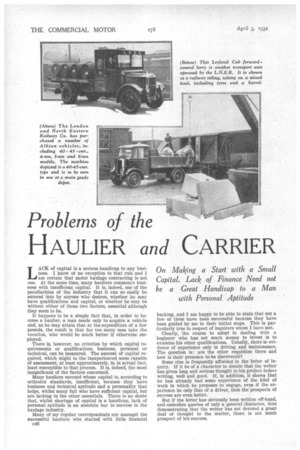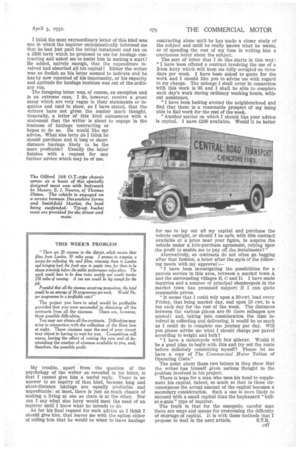Problems of the
Page 68

Page 69

If you've noticed an error in this article please click here to report it so we can fix it.
HAULIER and CARRIER
On Making a Start with a Small Capital. Lack of Finance Need not be a Great Handicap to a Man with Personal Aptitude
LACK of capital is a serious handicap to any business. I know of no exception to that rule and I am certain that motor haulage contracting is not one. At the same time, many hauliers commence business with insufficient capital. It is, indeed, one of the peculiarities of the industry that it can so easily be entered into by anyone who desires, whether lie may have qualifications and capital, or whether he may be without either of those two factors, essential although they seem to be.
It happens to be a simple fact that, in order to become a haulier, a man needs only to acquire a vehicle and, as he may attain that at the expenditure of a few pounds, the result is that far too many men take the vocation, who would be much better if otherwise employed.
There is, however, no criterion by which capital requirements or qualifications, business, personal or technical, can be measured. The amount of capital required, which might to the inexperienced seem capable of assessment, at least approximately, is, in actual fact, least susceptible to that process. It is, indeed, the most insignificant of the factors concerned.
Many hauliers succeed whose capital is, according to orthodox standards, insufficient, because they have business and technical aptitude and a personality that helps, whilst many fail who have sufficient capital, but are lacking in the other essentials. There is no doubt that, whilst shortage of capital is a handicap, lack of personal aptitude is an absolute bar to success in the haulage industry.
Many of my regular correspondents are amongst the successful hauliers who started with little financial c46
backing, and I am happy to be able to state that not a few of them have been successful because they have been guided by me in their initial steps. This is pap ticularly true in respect of inquirers whom I have met.
Clearly, the course to adopt in dealing with a beginner who has not much money to invest is to examine his other qualifications. Usually, there is evidence of experience only in driving and maintenance. The question is: are the other requisites there and how is their presence to be discovered?
Some clue is frequently afforded in the letter of inquiry. If it be of a character to denote that the writer has given long and serious thought to his project before writing, well and good. If, in addition, it shows that he has already had some experience of the kind of work in which he proposes to engage, even if the experience be only that of a driver, then the prospects of success are even better.
But if the letter has obviously been written off-hand, and embodies queries of only a general character, thus demonstrating that the writer has not devoted a great deal of thought to the matter, there is not much prospect of his success. I think the most extraordinary letter of this kind was one in which the inquirer enthusiastically informed me that he had just paid the initial instalment and tax on a £500 lorry which he proposed to use for haulage contracting and asked me to assist him in making a start! He added, naively enough, that the expenditure involved had absorbed all his capital! Either the writer was as foolish as his letter seemed to indicate and he has by now repented of his impetuosity, or his capacity and aptitude for haulage business was out of the ordinary run.
The foregoing letter was, of course, an exception and is an extreme case, I do, however, receive a great many which are very vague in their statements or inquiries and tend to show, as I have stated, that the writers have not given the matter much thought. Generally, a letter of this kind commences with a statement that the writer is about to engage in the business of haulage contracting or hopes to do so. He would like my advice. What size lorry do I think he should purchase and is long or shortdistance haulage likely to be the more profitable? Usually the letter finishes with a request for any further advice which may be of use.
My trouble, apart from the question of the psychology of the writer as revealed in his letter, is that I cannot give him a useful reply. There is no answer to an inquiry of that kind, because long and short-distance haulage are equally profitable and unprofitable: at least, there is just as much chance of making a living at one as there is at the other. Nor MA I say what size lorry would meet the need of an inquirer until I know what he intends to do.
As for his final request for such advice as I think I should give him, that leaves me with the option either of telling him that he would be wiser to leave haulage contracting alone until he has made a closer study of the subject and until he really knows what he wants, or of spending the rest of my time in writing him a continuous letter about the subject.
The sort of letter that I do like starts in this way : "I have been offered a contract involving the use of a 2-ton lorry which will keep me fully occupied on three days per week. I have been asked to quote for the work and I should like you to advise me with regard to my charge. The mileage I shall cover in connection with this work is 95 and I shall be able to complete each day's work during ordinary working hours, without assistance.
"I have been looking around the neighbourhood and find that there is a reasonable prospect of my being able to find work for the rest of the week.
"Another matter on which I should like your advice is capital. I have £200 available. Would it be better for me to lay out all my capital and purchase the vehicle outright, or should I be safe, with this contract available at a price near your figure, to acquire the vehicle under a hire-purchase agreement, relying upon the profit to enable me to pay off the instalments?" Alternatively, as contracts do not often go begging after that fashion, a letter after the style of the following meets with my approval:— " I have been investigating the possibilities for a parcels service in this area, between a market town A and the surrounding villages 13, 0 and D. I have made inquiries and a number of principal shopkeepers in the market town has promised support if I can quote reasonable prices.
" It seems that I could rely upon a 30-cwt. load every Friday, that being market day, and upon 10 cwt. to a ton each day for the rest of the week. The distances between the various places are 00 (here mileages are quoted) and, taking into consideration the time involved in collecting and delivering, it would be as much as I could do to complete one journey per day. Will you please advise me what I should charge per parcel according to weight and bulk?
"I have a motorcycle with box sidecar. Would it be a good plan to begin with this and try out the route before definitely committing myself? Please let me ha,ve a copy of The Commercica Motor Tables of Operating Costs."
The point about these two letters is they show that the writer has himself given serious thought to the problem involved in his project. There is hope for a man who uses his head to supplement his capital, indeed, so much so that in those circumstances the actual amount of the capital becomes a secondary consideration. Such a one is more likely to succeed with a small capital than the haphazard " bullat-a-gate " type of inquirer.
The truth is that for the energetic, careful man there are ways and means for overcoming the difficulty of shortage of capital. It is with these methods that I propose to deal in the next article. S.T.R.












































































































